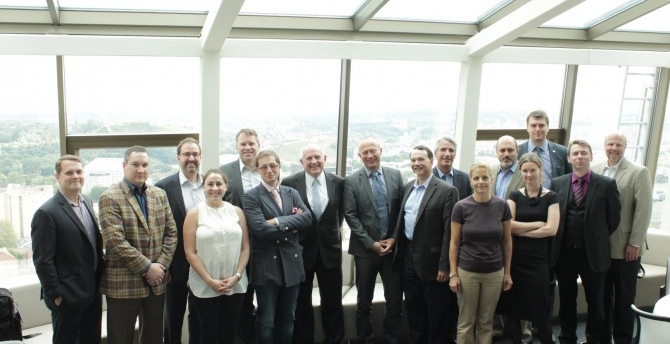
On the occasion of the 25th anniversary of the Lithuanian Free Market Institute (LFMI), and nearly one year since the organization won the 2014 Templeton Freedom Award, the Vilnius-based think tank welcomed CEOs from Atlas Network partner organizations across Europe and the United States for the inaugural Transatlantic CEO Summit, a premier offering of Atlas Leadership Academy.
Punctuating both events, including LFMI’s celebratory dinner and the CEO Summit’s salon-style luncheon, were presentations by Atlas Network’s 2015 Templeton Leadership Fellow Charles Murray, whose latest book, By the People: Rebuilding Liberty Without Permission, offers a bold remedy for restoring the free society. Murray’s was not the only bold remedy presented during the summit, as some of the network’s most ambitious and creative CEOs workshopped their best ideas for achieving liberty throughout the world.

Brad Lips hosts Atlas Network Templeton Leadership Fellow Charles Murray for a salon-style discussion about his new book, By the People.
“Convening this summit was about looking into the future and asking important questions,” explained Brad Lips, Atlas Network’s CEO, who delivered opening remarks. “The collective wisdom of the leaders assembled was impressive, but everyone was really focused on pushing our movement to do more, to figure out how to achieve breakthrough successes.”

One of the views of Vilnius from donated meeting space courtesy of Teo.
Strategy sessions were anchored around a selection of readings designed to challenge conventional thinking and provoke debate. After reading the late John Blundell’s essay “How to Move a Nation,” which was republished as the first chapter of his book Waging the War of Ideas, participants considered the history and evolution of the think tank model and weighed the pros and cons of modern variations in form, strategy and tactics.

From left to right: Karin Svanborg-Sjovall, Lawson Bader, Martin Agerup.
A sample of author and entrepreneur Dan Pallotta’s writing for Harvard Business Review kicked off a discussion about how to think big and optimize resources (ideas he also presented in a popular Ted talk). Emphasis was placed on taking considerable care to use metrics meaningfully both to improve accountability and to steer decision-making.

From left to right: Michael Carnuccio, Matt Warner, Joe Lehman.
Participants also responded to the thinking behind the widely viewed Netflix slide deck, an elaboration of the company’s institutional values that was created by the Netflix human resources team to communicate its somewhat avant-garde approach toward employees. This led to a rich discussion of best practices for recruiting and retaining talented team members who can contribute to and support a productive organizational culture.
Most of the summit’s energy was spent, however, on crafting new conceptual frameworks for capturing the public’s imagination, engaging its moral intuitions, and communicating more effectively the virtues of liberty. Žilvinas Šilėnas, CEO of local host LFMI, challenged participants to consider how well they are proactively shaping popular thinking versus reacting to it.

LFMI President Žilvinas Šilėnas leads a discussion on big ideas.
Every participant came to the summit acutely aware of the stakes, referencing the latest reports on government debt obligations around the world and philanthropic trends in favor of more government control over the lives and livelihoods of the world’s people. Those stakes were further brought into focus during two of the educational off-site events. One included a briefing with the foreign ministry where participants received the latest intelligence on Russian and Ukranian relations, as well as the broader geopolitical landscape in the region. The second concluded with a sobering tour of the Museum of Genocide Victims, located in a building that had served as a site of torture and extermination, first by the Nazis and later by the KGB.

Lithuania’s foreign ministry hosted CEO Summit participants for a briefing on geopolitical issues relevant to the region.
“It’s humbling to remember what this cause is truly about,” Lips remarked. “It’s about ensuring all people everywhere are afforded the freedom and dignity to live in peace. This is why it’s important to challenge each other and to ask: How can we become more effective?”

Atlas Network CEO Brad Lips argues for thinking about future needs when hiring talent today.
Participants departed with new ideas to take home and new collaborations already in the works. Just as important, new friendships and new working relationships promise to strengthen the worldwide freedom movement in the months to come.
Mark Littlewood and Lawson Bader signal their enthusiasm at the site of the historic Gediminas’ Tower.
“I'm struggling to think of a 72-hour period in my professional life where I have learnt so much of such practical benefit and I'm enormously grateful to the Atlas team for this innovative and inspiring event,” concluded Mark Littlewood, director general of the UK-based Institute of Economic Affairs.

Discussion never stopped as CEOs walked in transit between meetings throughout the historic old town of Vilnius. From left to right: Martin Agerup, John Tillman, Karin Svanborg-Sjovall and Mark Littlewood.
Atlas Network would like to especially thank the entire team at Lithuanian Free Market Institute for their leadership and administrative support for this event.